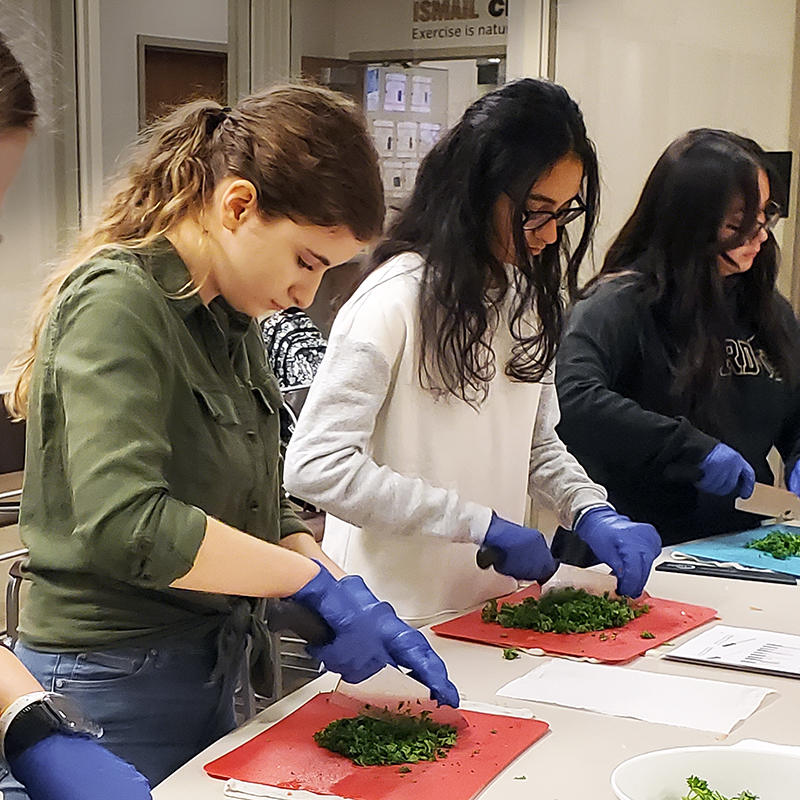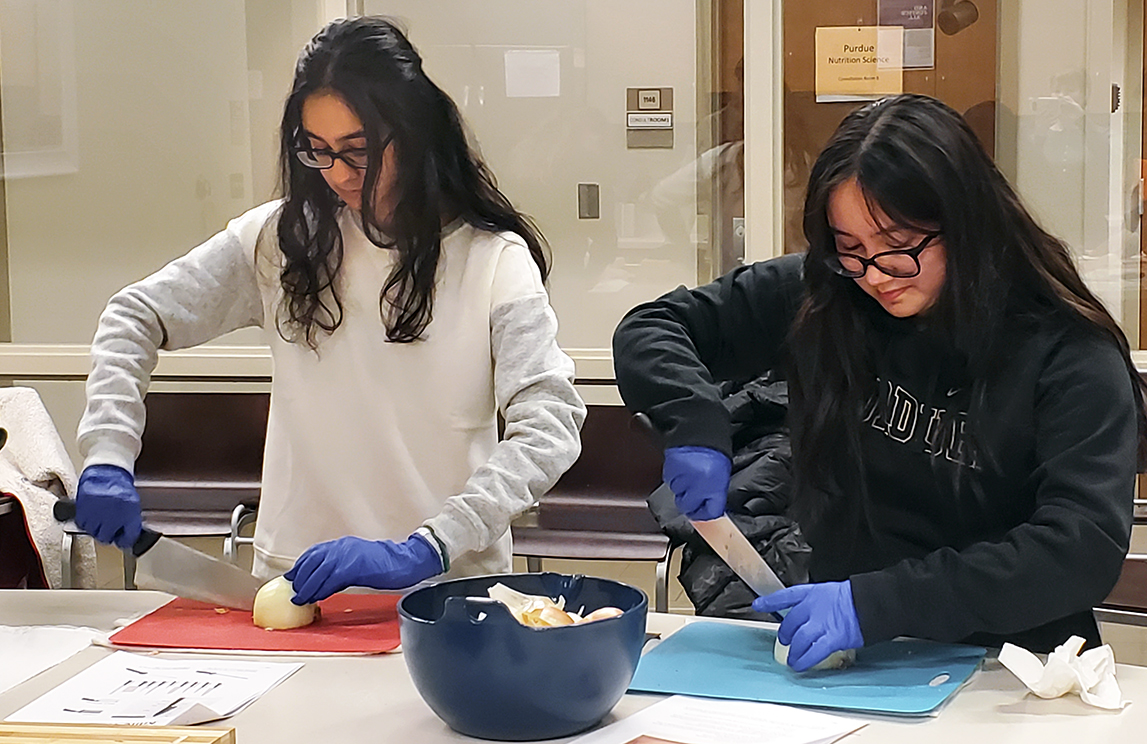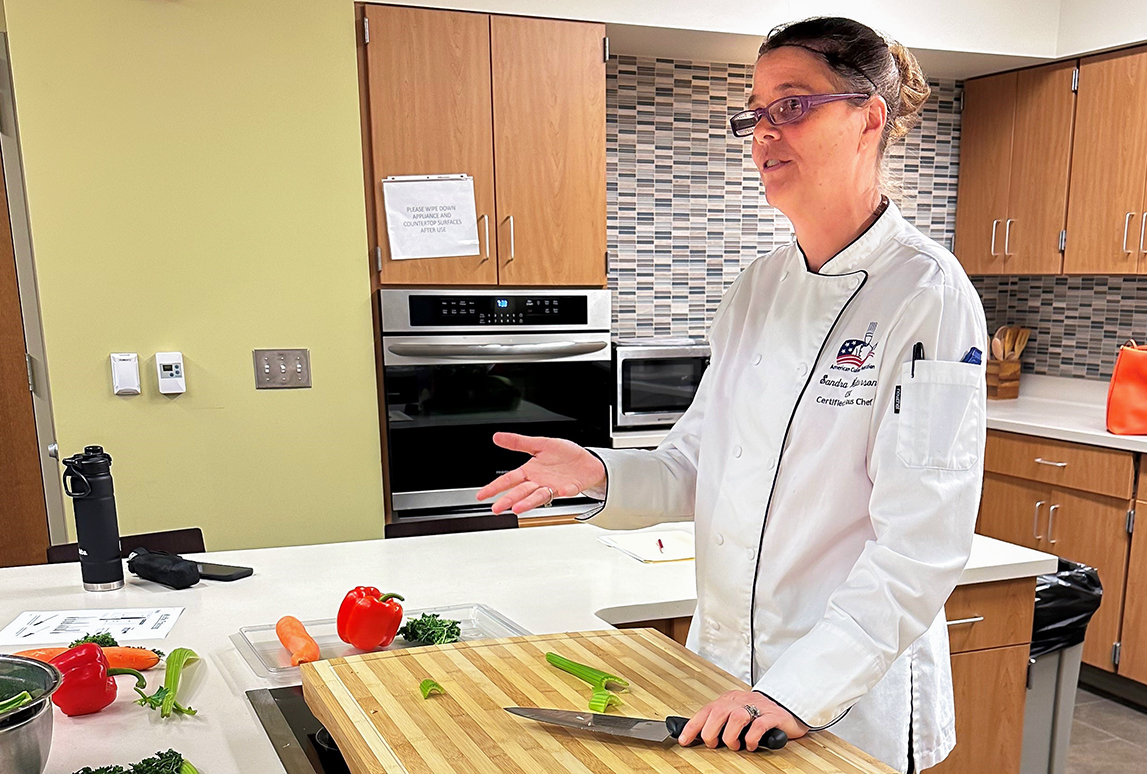Purdue Dining and Nutrition Science Collaboration

Thanks to a new collaboration between Purdue Dining & Culinary and the Department of Nutrition Science, students in the Dietetics Residential Program Learning Community were afforded the opportunity to expand their culinary skills.
The program, titled “Coming Together: A Culinary and Cultural Experience,” extended skill development beyond the classroom to allow students to learn culinary skills from a chef, develop communication skills by consulting with clients about foods and recipes for catered multicultural events and practice culinary skills by preparing food for these events. The program was funded by a grant from the Office of Experiential Education (ExEd), which provided an ExEd Program Development Mini-Grant of $3,000, and was one of only three selected for support.

The goals of the program were for students to demonstrate professional communication and documentation, build cultural understanding, learn safety and sanitation principles, and gain an understanding of the processes involved in delivering quality food and nutrition services. Rachel A. Clark, MS, RD, clinical assistant professor, and Dinah Dalder, MS, RD, clinical associate professor, both from the Department of Nutrition Science, coordinated programming with Gretchen Jewell, associate director of Auxiliary Dining Services, and Molly Winkeler, MS, RD, nutrition success manager, from Dining & Culinary.
“Students with career goals of becoming Registered Dietitian Nutritionists (RDNs) often lack food-related knowledge and skills, and may have narrow experiences with a variety of foods, including minimal exposure to customary foods and authentic recipes from different cultures,” wrote Clark.
Ten students from the learning community completed training on knife and basic culinary skills with Dining & Culinary chefs as well as AllerTrain, an allergen training, with Winkeler. Participants spent time assisting Dining & Culinary staff in the planning and execution of the Lunar New Year meal, ranging from recipe selection to food preparation. Students met one-on-one with an Intercultural Development Inventory (IDI®) qualified administrator as to assess cultural competence and discuss their experiences.
Madison Wathen, a first-year student in the learning community, found the experience rewarding overall, especially the opportunities for hands-on learning.
“I liked how hands-on everything was,” Wathen says. “I like working with food, so just having that opportunity is very rewarding for me and I really enjoyed that part of it. We learned the basics of different cuts, how to safely handle and clean a knife and how to create a safe environment for others while in the kitchen.”

Samantha Johnson, another first-year student in the learning community, says working with Dining & Culinary expanded upon her previous experiences.
“I did culinary arts in high school so I’ve done some work on things like that, but I’d never really done catering or event planning before,” Johnson says. “It was cool to get exposure to that side of it. I got exposed to working with different kinds of people and it was a reminder that no matter where I work, I’m going to be working with different groups of people. It’s really good to practice being in those different types of environments.”
The partnership is an example of Dining & Culinary’s commitment to supporting student growth beyond the classroom. Dining & Culinary is fueling the future and building a community where everyone has a seat at the table. By crafting a residential dining experience and fostering community building, Dining & Culinary provides an essential support system for the well-being of students, with compassion that goes beyond the meal. As champions of each step Boilermakers take on their academic journeys and the student experience, Dining & Culinary offers student employment and cocurricular learning opportunities for students to practice communication, leadership, decision-making, problem-solving and teamwork while preparing for successful careers.
The Dietetics Residential Program Learning Community is one of seven learning communities offered in partnership between University Residences and the College of Health and Human Sciences. Learning communities allow students to connect with peers and faculty who share similar interests while taking classes together and living in the same residence hall. More than 3,000 first-year students annually participate in learning communities across all disciplines at the University.
Written by: Matthew Vader, Writer, Student Life Marketing
 .
.